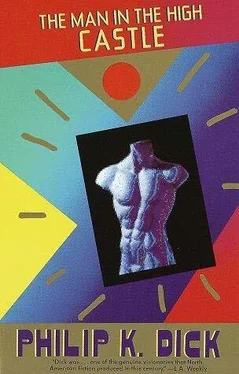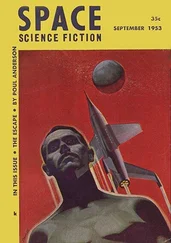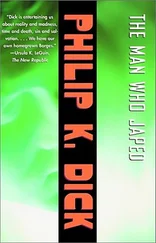At three o’clock the University called.
“Mr. Childan,” the voice said, “you wanted this weapon tested for authenticity, this 1860 Army Model Colt .44.” A pause, while Childan gripped the phone with apprehension. “Here’s the lab report. It’s a reproduction cast from plastic molds except for the walnut. Serial numbers all wrong. The frame not casehardened by the cyanide process. Both brown and blue surfaces achieved by a modern quick-acting technique, the whole gun artificially aged, given a treatment to make it appear old and worn.”
Childan said thickly, “The man who brought it to me for appraisal—”
“Tell him he’s been taken,” the University technician said. “And very taken. It’s a good job. Done by a real pro. See, the authentic gun was given its—you know the bluemetal parts? Those were put in a box of leather strips, sealed, with cyanide gas, and heated. Too cumbersome, nowadays. But this was done in a fairly well-equipped shop. We detected particles of several polishing and finishing compounds, some quite unusual. Now we can’t prove this, but we know there’s a regular industry turning out these fakes. There must be. We’ve seen so many.”
“No,” Childan said. “That is only a rumor. I can state that to you as absolute fact, sir.” His voice rose and broke screechingly. “And I am in a position to know. Why do you think I sent it to you? I could perceive its fakery, being qualified by years of training. Such as this is a rarity, an oddity. Actually a joke. A prank.” He broke off, panting. “Thank you for confirming my own observations. You will bill me. Thank you.” He rang off at once.
Then, without pausing, he got out his records. He began tracing the gun. How had it come to him? From whom?
It had come, he discovered, from one of the largest wholesale suppliers in San Francisco. Ray Calvin Associates, on Van Ness. At once he phoned them.
“Let me talk to Mr. Calvin,” he said. His voice had now become a trifle steadier.
Presently a gruff voice, very busy. “Yes.”
“This is Bob Childan. At A.A.H. Inc. On Montgomery. Ray, I have a matter of delicacy. I wish to see you, private conference, sometime today in your office or et cetera. Believe me, sir. You had better heed my request.” Now, he discovered, he was bellowing into the phone.
“Okay,” Ray Calvin said.
“Tell no one. This is absolutely confidential.”
“Four o’clock?”
“Four it is,” Childan said. “At your office. Good day.” He slammed the receiver down so furiously that the entire phone fell from the counter to the floor; kneeling, he gathered it up and replaced it in its spot.
There was half an hour ahead before he should start; he had all that time to pace, helpless, waiting. What to do? An idea. He phoned the San Francisco office of the Tokyo Herald , on Market Street.
“Sirs,” he said, “please tell me if the carrier Syokaku is in the harbor, and if so, how long. I would appreciate this information from your estimable newspaper.”
An agonizing wait. Then the girl was back.
“According to our reference room, sir,” she said in a giggling voice, “the carrier Syokaku is at the bottom of the Philippine Sea. It was sunk by an American submarine in 1945. Any more questions we can help you with, sir?” Obviously they, at the newspaper office, appreciated the wild-goose variety of prank that had been played on him.
He hung up. No carrier Syokaku for seventeen years. Probably no Admiral Harusha. The man had been an imposter. And yet—
The man had been right. The Colt .44 was a fake.
It did not make sense.
Perhaps the man was a speculator; he had been trying to corner the market in Civil War period side arms. An expert. And he had recognized the fake; he was the professional of professionals.
It would take a professional to know. Someone in the business. Not a mere collector.
Childan felt a tiny measure of relief. Then few others would detect. Perhaps no one else. Secret safe.
Let matter drop?
He considered. No. Must investigate. First of all, get back investment; get reimbursement from Ray Calvin. And—must have all other artifacts in stock examined by University lab.
But—suppose many of them are non-authentic?
Difficult matter.
Only way is this, he decided. He felt grim, even desperate. Go to Ray Calvin. Confront him. Insist that he pursue matter back to source. Maybe he is innocent, too. Maybe not. In any case, tell him no more fakes or I will not buy through him ever again .
He will have to absorb the loss, Childan decided. Not I. If he will not, then I will approach other retail dealers, tell them; ruin his reputation. Why should I be ruined alone? Pass it on to those responsible, hand hot potato back along line.
But it must be done with utmost secrecy. Keep matter strictly between ourselves.
The telephone call from Ray Calvin puzzled Wyndam-Matson. He could not make sense out of it, partly because of Calvin’s rapid manner of speech and partly because at the moment the call came—eleven-thirty in the evening—Wyndam-Matson was entertaining a lady visitor in his apartment at the Muromachi Hotel.
Calvin said, “Look here, my friend, we’re sending back that whole last shipment from you people. And I’d send back stuff before that, but we’ve paid for everything except the last shipment. Your billing date May eighteenth.”
Naturally, Wyndam-Matson wanted to know why.
“They’re lousy fakes,” Calvin said.
“But you knew that.” He was dumbfounded. “I mean, Ray, you’ve always been aware of the situation.” He glanced around; the girl was off somewhere, probably in the powder room.
Calvin said, “I knew they were fakes. I’m not talking about that. I’m talking about the lousy part. Look, I’m really not concerned whether some gun you send us really was used in the Civil War or not; all I care about is that it’s a satisfactory Colt .44, item whatever-it-is in your catalog: It has to meet standards. Look, do you know who Robert Childan is?”
“Yes.” He had a vague memory, although at the moment he could not quite pin the name down. Somebody important.
“He was in here today. To my office. I’m calling from my office, not home; we’re still going over it. Anyhow, he came in and rattled off some long account. He was mad as hell. Really agitated. Well, evidently some big customer of his, some Jap admiral, came in or had his man come in. Childan talked about a twenty-thousand-dollar order, but that’s probably an exaggeration. Anyhow, what did happen—I have no cause to doubt this part—is that the Japanese came in, wanted to buy, took one look at one of those Colt .44 items you people turn out, saw it to be a fake, put his money back in his pants pocket, and left. Now. What do you say?”
There was nothing that Wyndam-Matson could think of to say. But he thought to himself instantly. It’s Frink and McCarthy. They said they’d do something, and this is it. But—he could not figure out what they had done; he could not make sense out of Calvin’s account.
A kind of superstitious fright filled him. Those two—how could they doctor an item made last February? He had presumed they would go to the police or the newspapers, or even the pinoc government at Sac, and of course he had all those taken care of. Eerie. He did not know what to tell Calvin; he mumbled on for what seemed an endless time and at last managed to wind up the conversation and get off the phone.
When he hung up he realized, with a start, that Rita had come out of the bedroom and had listened to the whole conversation; she had been pacing irritably back and forth, wearing only a black silk slip, her blond hair falling loosely over her bare, slightly freckled shoulders.
Читать дальше










